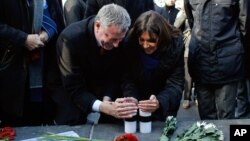The bouquets and graffiti are faded at the Place de la Republique.
Just a month ago, thousands of French staged rallies at the site in defense of free expression and against extremism. That was just after the back-to-back terrorist attacks against the Charlie Hebdo magazine and a kosher supermarket that killed 17 people in the capital.
Madeleine Favre joined a handful of passers-by looking at the mementos for the victims, at the foot of the giant statue of Marianne, the symbol of France. Favre was back visiting her native Paris from Canada, where she now lives.
"Of course, it can happen everywhere," she said. "Nobody is secure now, I think, these days. It's just terrorism. It has nothing to do with Islam. It's just how we have to live now."
But Josefa Suarez, who arrived with a pink rose, disagreed.
Suarez moved to France from Spain 50 years ago. She said the most recent generation of immigrants — Muslims like the attackers, with roots in North and sub-Saharan Africa — are no good. They have no education and they let their kids run wild, she said, adding that the government needs to reduce the birth rate and give them some schooling.
In many ways, Paris has returned to normal. The skating rink in front of City Hall is packed with children and adults. At the Eiffel Tower, tourists like Jalel Azzawe, from Iraq, appear unfazed.
"We see everything is good," Azzawe said. "Everything is safe, actually. Everything is normal. There is not any danger. Anyone can come and anyone can enjoy."
The French government has taken a number of security measures to keep tourists and French safe. It's dispatched more than 10,000 soldiers to guard sensitive sites in Paris and around the country. Those measures, however, did not stop a knife attack this week against three soldiers in the southern city of Nice.
The government has also announced longer-term measures, like teaching secularity in public schools. Sylvie, who teaches middle school in a French suburb, said she thought that was a good start.
She also agreed on the need to transmit values like tolerance and accepting others in schools, but she said children need to be taught to be more critical of information — including about jihadism — that circulates on the Internet.
Not everybody feels secure these days. Alain Soucot, who was window-shopping in the old Jewish quarter of Paris, said he's considering leaving, making his Aliyah — the Hebrew term for moving to Israel.
A record 7,000 French Jews emigrated to Israel last year for a mix of reasons, including anti-Semitism. But Soucot said his son already lives there, which is one reason he wants to leave.
The attacks are just another warning, he said, that Jews like himself need to go.




